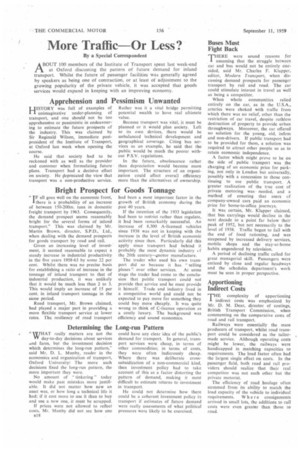Bright Prospect for Goods Tonnage
Page 108

If you've noticed an error in this article please click here to report it so we can fix it.
" IF all goes well on the economic front, I there is a 'probability of an increase of between 150-200m. tons in domestic freight transport by 1963. Consequently, the demand prospect seems reasonably bright for the several forms of inland transport." This was claimed by Mr. Martin Brown, director, S.P.D., Ltd., when dealing with the demand prospects for goods transport by road and rail.
Given an increasing level of investment, it seemed reasonable to expect a steady increase in industrial productivity in the five years 1958-63 by some 22 per cent. Whilst there was no precise basis for establishing a ratio of increase in the tonnage of inland transport to that of industrial production, it was unlikely that it would be much less than 2 to 3. This would imply an increase of 15 per cent, in inland transport tonnage in the same period.
Road transport, Mr. Brown claimed, had played a major part in providing a more flexible transport service at lower rates. The resiliency of road transport had been a most important factor in the growth of British economy during the past 40 years.
If the intention of the 1933 legislation had been to restrict rather than regulate, it had been remarkably successful. An increase of 8,300 A-licensed vehicles since 1938 was not in keeping with the increase in the level of British economic activity since then. Particularly did this apply since transport had behind it probably the most dynamic industry a the 20th century—,motor manufacture.
The trader who used his own transport did so because it has " selling pluses" over other services. At some stage the trader had come to the conclusion that public transport could not provide that service and he must provide it himself. Trade and industry lived in a competitive world and could not be expected to pay more for something they could buy more cheaply. It was quite wrong to think of C-licence operation as a costly luxury. The background was efficiency and sound economics.




























































































































































